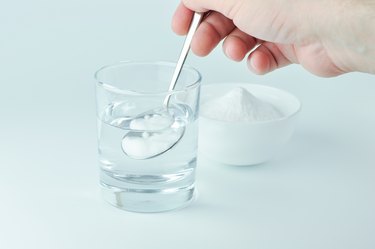
Sometimes people looking for natural heartburn relief turn to baking soda. Used as a leavening agent for baking and an odor absorber for refrigerators, baking soda has one ingredient — sodium bicarbonate — and its antacid properties also may help soothe your stomach. But the amount you use is key.
Video of the Day
Video of the Day
How It Might Help
"Baking soda, or sodium bicarbonate, when added to water and ingested in very dilute amounts may help to neutralize stomach acid and therefore calm an upset stomach, similar to the neutralizing effect of antacids like calcium carbonate," says Heather Campbell, RDN, LDN, a dietitian/nutritionist based in Montgomery, Alabama.
"The biggest difference between sodium bicarbonate and calcium carbonate in the acidic environment of the stomach is the way it neutralizes the acid, and what the leftover byproducts are," Campbell says. "Because of these different chemical reactions, drinking baking soda water regularly is not recommended due to potential malabsorption and dysfunction of the stomach."
Mayo Clinic agrees, noting that when taken as prescribed by your doctor or as directed on the box label, drinking baking soda water can relieve heartburn or stomach ulcer symptoms. Just be sure to dose it properly, Mayo adds. If you are prescribed sodium bicarbonate by your doctor, carefully follow the prescription label instructions. If you're treating yourself, look at the manufacturer's directions to get the right dosage.
How much should you take? Dosage recommendations may vary from person to person, depending on how often you're taking it throughout the day and the length of time you're taking it — factors affected by the medical condition you're trying to treat.
The average dosage to relieve heartburn or sour stomach for adults and teenagers, according to the Mayo Clinic, is 1/2 teaspoon of sodium bicarbonate powder in a glass of water every two hours. Younger children should not drink baking soda water unless advised to do so by their doctor.
Also, Mayo Clinic adds that you should not take sodium bicarbonate within one to two hours of taking another medication. You shouldn't take it with large amounts of milk or milk products. And you should not take it for more than two weeks or if you have frequent symptoms — consult your doctor instead.
When to Be Wary
You've more than likely added a teaspoon or two of baking soda to batter to help cakes and breads rise in the oven. Or, you may have taken it as directed to ease stomach acid. Used these ways, baking soda is considered nontoxic.
However, ingesting too much baking soda could be potentially dangerous because sodium bicarbonate can be poisonous in large amounts. The U.S. National Library of Medicine refers to this as "soda loading," which is when individuals, often athletes, drink extra baking soda to improve performance, though there is no proven benefit to doing so.
The problem may also happen accidentally.
A study in the Journal of Clinical Pharmacy and Therapeutics in December 2013 reviewed 192 cases of people who called the California Poison Control System after taking baking soda powder. Most had used baking soda as an antacid, though others had taken it in an attempt to "beat" a urine drug test or treat a urinary tract infection.
More than half of the people in the study had to seek medical evaluation, and 12 people were admitted to the hospital with electrolyte, metabolic or breathing issues, all due to the misuse of baking soda. The authors also warn that treating yourself at home with baking soda may mask medical problems or delay medical care, and, in turn, make medical problems worse.
On that note, the Mayo Clinic cautions that if you have certain medical problems, you should contact your doctor before drinking baking soda water. They include:
- Appendicitis.
- Intestinal or rectal bleeding.
- Edema (swelling of the lower legs or feet).
- Heart disease.
- High blood pressure (hypertension).
- Kidney disease.
- Liver disease.
- Problems with urination.
- Toxemia of pregnancy (also known as preeclampsia, which is a condition that involves high blood pressure during pregnancy).
Baking soda poisoning comes with signs. According to the National Library of Medicine, symptoms of a baking soda overdose may include:
- Constipation.
- Convulsions.
- Diarrhea.
- Feeling full.
- Frequent urination.
- Irritability.
- Muscle spasms.
- Muscle weakness.
- Vomiting.
The national toll-free Poison Help hotline — 1-800-222-1222 — can help you contact your local poison control center.
Read more: Does Baking Soda Help You Lose Weight?
- Heather Campbell, MS, RDN, LDN, dietitian, Glory Nutrition, Montgomery, Alabama
- U.S. National Library of Medicine: “Baking Soda Overdose”
- Mayo Clinic: “Sodium Bicarbonate: Proper Use”
- Mayo Clinic: “Sodium Bicarbonate: Before Using”
- Mayo Clinic: “Sodium Bicarbonate: Precautions”
- Journal of Clinical Pharmacy and Therapeutics: “Baking Soda Misuse as a Home Remedy: Case Experience of the California Poison Control System”
Is this an emergency? If you are experiencing serious medical symptoms, please see the National Library of Medicine’s list of signs you need emergency medical attention or call 911.